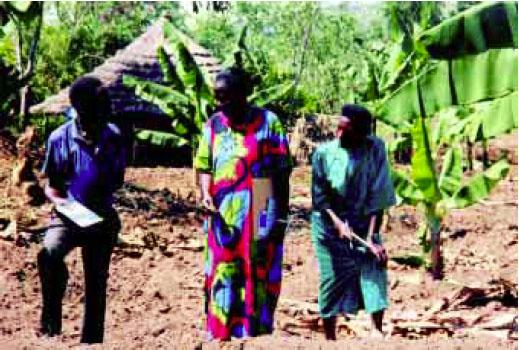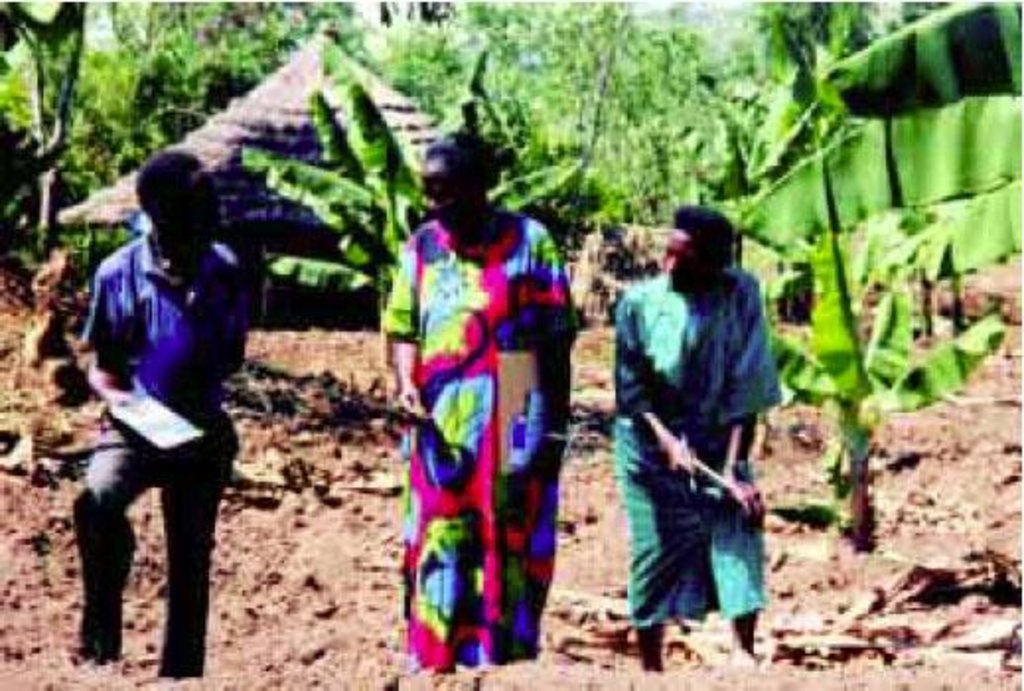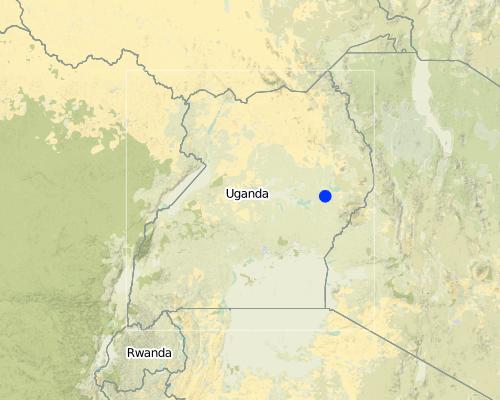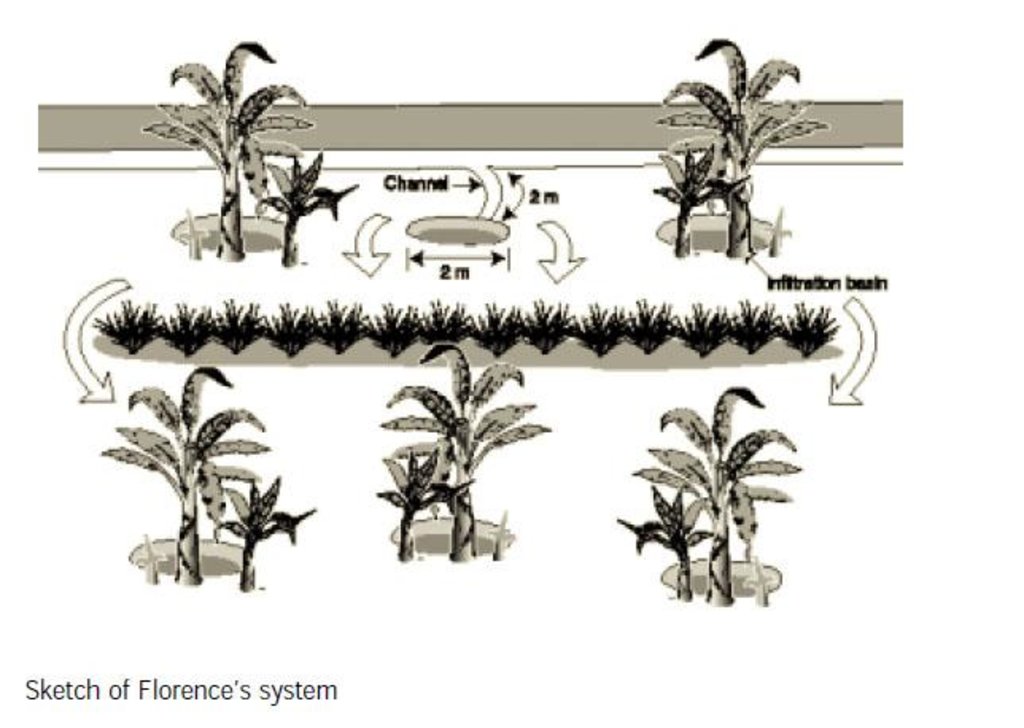Runoff water harvesting for bananas [اوغندا]
- تاريخ الإنشاء:
- تحديث:
- جامع المعلومات: Alex Lwakuba
- المحرر: –
- المُراجع: Fabian Ottiger
technologies_1390 - اوغندا
عرض الأقسام
توسيع الكل طي الكل1. معلومات عامة
1.2 تفاصيل الاتصال بالأشخاص الرئيسيين لمصدر المعلومات والمؤسسات المشاركة في تقييم وتوثيق التقنية
متخصص في الإدارة المستدامة للأراضي:
Imoko-otim Charles, P.
MMAIF, DEPT of Agriculture
Kachumbala subcounty, Kumi District
اوغندا
اسم المؤسسة (المؤسسات) التي سهلت توثيق/تقييم التقنية (إذا كان ذلك على صلة)
Ministry of Agriculture, Animal Industry, and Fisheries of Uganda (MAAIF) - اوغندا1.3 الشروط المتعلقة باستخدام البيانات الموثقة من خلال WOCAT
متى تم تجميع البيانات (ميدانيا)؟:
08/04/2000
يوافق جامع المعلومات والشخص (لاشخاص) الرئيسي لمصدر المعلومات على الشروط المتعلقة باستخدام البيانات الموثقة من خلال WOCAT:
نعم
2. وصف تقنيةالإدارة المستدامي للأراضي
2.1 وصف مختصر للتقنية
تعريف التقنية:
Run off water from a hill is harnessed and concentrated in a banana plantation using diversion and retention ditches respectively.
2.2 وصف تفصيلي للتقنية
الوصف:
Runoff water is diverted from the road running by the farm, using diversion ditches, 0.3 m deep and 0.3 m wide. Water is led first into semi-circular infiltration ditches that are 0.3 m deep, and 2 m in diameter. From these ditches, water flows through the banana plantation and is held by infiltration basins around which are groups of banana stools. Setaria grass is planted to stabilize the edges of the basins and is also used to stabilize a bund which runs through the plantation. Mulching is practised throughout the plantation,
primarily to reduce the loss of valuable moisture.
Purpose of the Technology: The technology is used to control soil erosion by runnig water from the hill top and also to harvest water and retain soil moisture for the banana palms which need adequate soil moisture for proper production. Dry vegetation and stover are used as mulch to reinforce moisture conservation.
Establishment / maintenance activities and inputs: The ditches are maintained by removing silt regularly. The grass is cut to avoid over growing.
Natural / human environment: The technology is applied on perennial crop land located in a semi arid area. The soil is predominantly sandy loam and shallow. Florence is a farmer and a married housewife. She is 40 years old and has a family of 12 to support
despite the fact the family is poorer than average. They own less than one hectare of land, but borrow an extra area to cultivate. Her main technical initiative is water harvesting, together with soil fertility improvement, in a matooke (cooking banana) plantation. She started in 1990. She practices harvesting of water from the road into her plantation, and has a system of trenches through which water circulates and is then held by basins around which are banana stools. She also mulches and plants grass barriers within
the plantation. There is some doubt whether the water harvesting can really be claimed as her own innovation, as there are variations of this practice in several nearby farms. Nevertheless her holistic management system is probably unique to the area.
2.3 صور التقنية
2.5 البلد/المنطقة/المواقع التي تم تنفيذ التقنية فيها والتي يغطيها هذا التقييم
البلد:
اوغندا
المنطقة/الولاية/المحافظة:
Kumi
مزيد من التفاصيل حول الموقع:
Kumi
Map
×2.6 تاريخ التنفيذ
في حالة عدم معرفة السنة بالتحديد، يرجى الإشارة إلى التاريخ التقريبي:
- منذ أكثر من 50 عامًا (تقليدي)
2.7 إدخال التقنية
حدد كيف تم إدخال التقنية:
- كجزء من النظام التقليدي (> 50 عامًا)
التعليقات (نوع المشروع، الخ):
it is a farmer own intiative
3. تصنيف تقنية الإدارة المستدامي للأراضي
3.1 الغرض الرئيسي ( الأغراض الرئيسية) للتقنية
- تحسين الإنتاج
- الحد من تدهور الأراضي ومنعه وعكسه
- خلق أثر اقتصادي مفيد
3.2 نوع (أنواع) استخدام الأراضي الحالية حيث يتم تطبيق التقنية

الأراضي الزراعية
- زراعة معمرة (غير خشبية)
المحاصيل الرئيسية (المحاصيل النقدية والغذائية):
Major cash and food crop: Banana
التعليقات:
Major land use problems (compiler’s opinion): adequate soil moisture, soil erosion by wind and running water, and declining soil fertility
Major land use problems (land users’ perception): unreliable rainfall, soil erosion, pest and diseases and inadequate capital
3.3 مزيد من المعلومات حول استخدام الأراضي
عدد مواسم الزراعة في السنة:
- 2
حدد:
Longest growing period in days: 90Longest growing period from month to month: Mar - JunSecond longest growing period in days: 90Second longest growing period from month to month: Sep - Nov
3.4 مجموعةالإدارة المستدامة للأراضي التي تنتمي إليها هذه التقنية
- حصاد المياه
- إدارة الري (بما في ذلك إمدادات المياه والصرف الصحي)
- تحويل المياه والصرف
3.5 انتشار التقنية
حدد انتشار التقنية:
- منتشرة بالتساوي على مساحة
إذا كانت التقنية منتشرة بالتساوي على منطقة ما، فحدد المنطقة التقريبية المغطاة:
- 10-1 كم2
التعليقات:
Total area covered by the SLM Technology is 10 m2.
3.6 التدابير التقنية في مجال إلادارة المستدامة للأراضي
3.7 الأنواع الرئيسية من تدهور الأراضي التي تناولتها التقنية

تآكل التربة بالمياه
- الوزن(Wt): فقدان التربة السطحية/تآكل السطح
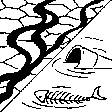
تدهور المياه
- (Ha): التجفيف
التعليقات:
Main type of degradation addressed: Wt: loss of topsoil / surface erosion, Ha: aridification
3.8 منع أو حد أو عكس تدهور الأراضي
تحديد هدف التقنية فيما يتعلق بتدهور الأراضي:
- منع تدهور الأراضي
4. المواصفات الفنية، وأنشطة التنفيذ، والمدخلات، والتكاليف
4.1 الرسم الفني للتقنية
4.2 المواصفات الفنية/شروحات الرسم الفني
Water harvesting for banana cultivation
Location: Kumi. Uganda
Technical knowledge required for field staff / advisors: low
Main technical functions: control of dispersed runoff: retain / trap, improvement of soil structure, water harvesting
Vegetative measure: on top of earth workd
Vegetative material: G : grass
Vegetative measure: Vegetative material: G : grass
Vegetative measure: Vegetative material: G : grass
Vegetative measure: Vegetative material: G : grass
Trees/ shrubs species: mango
Perennial crops species: bananas
Grass species: setaria
Retention/infiltration ditch/pit, sediment/sand trap
Vertical interval between structures (m): R
Spacing between structures (m): R
Depth of ditches/pits/dams (m): 0.3
Width of ditches/pits/dams (m): 1.5
Length of ditches/pits/dams (m): R
Structural measure: diversion ditch/cut-off drain
Vertical interval between structures (m): r
Spacing between structures (m): r
Depth of ditches/pits/dams (m): 0.3
Width of ditches/pits/dams (m): 0.3
Length of ditches/pits/dams (m): R
Height of bunds/banks/others (m): 0.3
Width of bunds/banks/others (m): 0.3
Length of bunds/banks/others (m): R
4.4 أنشطة التأسيس
| النشاط | نوع التدبير | التوقيت | |
|---|---|---|---|
| 1. | formation of bunds | نباتية | dry season |
| 2. | planting grass | نباتية | beginning of rains |
| 3. | digging ditches, making bunds | بنيوية أو هيكلية | dry season |
| 4. | planting grass | بنيوية أو هيكلية | beginning of rains |
| 5. | mulching | بنيوية أو هيكلية | end of rain |
4.5 التكاليف والمدخلات اللازمة للتأسيس
| تحديد المدخلات | الوحدة | الكمية | التكاليف لكل وحدة | إجمالي التكاليف لكل مدخل | % من التكاليف التي يتحملها مستخدمو الأراضي | |
|---|---|---|---|---|---|---|
| العمالة | Labour | ha | 1,0 | 120,0 | 120,0 | 100,0 |
| معدات | Tools | ha | 1,0 | 50,0 | 50,0 | 100,0 |
| المواد النباتية | Seedlings | ha | 1,0 | 200,0 | 200,0 | 100,0 |
| إجمالي تكاليف إنشاء التقنية | 370,0 | |||||
التعليقات:
Duration of establishment phase: 12 month(s)
4.6 الصيانة/الأنشطة المتكررة
| النشاط | نوع التدبير | التوقيت/الوتيرة | |
|---|---|---|---|
| 1. | cuttin back | نباتية | /each cropping season |
| 2. | mulching banana | نباتية | /twice a season |
| 3. | desilting | بنيوية أو هيكلية | rainy/each cropping season |
| 4. | cutting back the grass | بنيوية أو هيكلية | when overgrown/each cropping season |
| 5. | mulching | بنيوية أو هيكلية | each cropping season |
4.7 التكاليف والمدخلات اللازمة للصيانة/للأنشطة المتكررة (سنويًا)
| تحديد المدخلات | الوحدة | الكمية | التكاليف لكل وحدة | إجمالي التكاليف لكل مدخل | % من التكاليف التي يتحملها مستخدمو الأراضي | |
|---|---|---|---|---|---|---|
| العمالة | Labour | ha | 1,0 | 1440,0 | 1440,0 | 100,0 |
| معدات | Tools | ha | 1,0 | 50,0 | 50,0 | 100,0 |
| إجمالي تكاليف صيانة التقنية | 1490,0 | |||||
التعليقات:
labour, length of structure
4.8 أهم العوامل المؤثرة على التكاليف
قدم وصفا لأهم العوامل التي تؤثر على التكاليف:
labour, soil depth, tools
5. البيئة الطبيعية والبشرية
5.1 المناخ
هطول الأمطار السنوي
- < 250 مم
- 251- 500 ملم
- 501 - 750ملم
- 1,000-751 ملم
- 1,500-1,100 ملم
- 2,000-1,500 ملم
- 3,000-2,001 ملم
- 4,000-3,100 ملم
- > 4000 ملم
المنطقة المناخية الزراعية
- شبه قاحلة
5.2 طوبوغرافيا
متوسط الانحدارات:
- مسطح (0-2%)
- بسيط (3-5%)
- معتدل (6-10%)
- متدحرج (11-15%)
- تلال (16-30%)
- شديدة الانحدار(31-60%)
- فائقة الانحدار (>60%)
التضاريس:
- هضاب/سهول
- أثلام مرتفعة
- المنحدرات الجبلية
- منحدرات التلال
- منحدرات في السفوح
- قاع الوادي
المنطقة الارتفاعية:
- 100-0 متر فوق سطح البحر
- 500-101 متر فوق سطح البحر
- 1,000-501 متر فوق سطح البحر
- 1,500-1,001 متر فوق سطح البحر
- 2,000-1,501 متر فوق سطح البحر
- 2,500-2,100 متر فوق سطح البحر
- 3,000-2,501 متر فوق سطح البحر
- 4,000-3,001 متر فوق سطح البحر
- > 4000 متر فوق سطح البحر
5.3 التربة
متوسط عمق التربة:
- ضحل جدًا (0-20 سم)
- ضحلة (21-50 سم)
- متوسطة العمق (51-80 سم)
- عميقة (81-120 سم)
- عميقة جدًا (> 120 سم)
المواد العضوية في التربة السطحية:
- متوسطة (1-3%)
إذا كان متاحًا، قم بإرفاق وصف كامل للتربة أو تحديد المعلومات المتوفرة، على سبيل المثال نوع التربة، الرقم الهيدروجيني/ درجة حموضة التربة، قدرة التبادل الكاتيوني، النيتروجين، الملوحة وما إلى ذلك.
Soil fertility: Medium
Soil drainage/infiltration: Good
Soil water storage capacity: Low
5.6 خصائص مستخدمي الأراضي الذين يطبقون التقنية
التوجه السوقي لنظام الإنتاج:
- الكفاف (الإمداد الذاتي)
- مختلط (كفاف/ تجاري)
الدخل من خارج المزرعة:
- أقل من % 10من كامل الدخل
المستوى النسبي للثروة:
- ثري
مستوى المكننة:
- عمل يدوي
اذكر الخصائص الأخرى ذات الصلة لمستخدمي الأراضي:
Population density: 10-50 persons/km2
Annual population growth: > 4%
10% of the land users are rich and own 20% of the land.
25% of the land users are average wealthy and own 30% of the land.
60% of the land users are poor and own 50% of the land.
5% of the land users are poor.
Off-farm income specification: most of the income is derived from the farm, however some members are employed outside.
Level of mechanization: Manual work (only family labour)
Market orientation: Mixed and subsistence (bananas produced for home consumption and surplus for sell)
5.7 متوسط مساحة الأرض المملوكة أو المستأجرة من قبل مستخدمي الأراضي الذين يطبقون التقنية
- < 0.5 هكتارا
- 0.5 - 1 هكتار
- 1 -2 هكتار
- 2 - 5 هكتار
- 5 - 15 هكتار
- 15 - 50 هكتار
- 50 - 100هكتار
- 500-100 هكتار
- 1,000-500 هكتار
- 10,000-1,000 هكتار
- > 10,000 هكتار
5.8 ملكية الأراضي، وحقوق استخدام الأراضي، وحقوق استخدام المياه
ملكية الارض:
- فردية، لا يوجد سند ملكية
- customary
حقوق استخدام الأراضي:
- فردي
6. الآثار والتصريحات الختامية
6.1 الآثار التي أظهرتها التقنية في الموقع
الآثار الاجتماعية والاقتصادية
الإنتاج
إنتاج المحاصيل
الدخل والتكاليف
دخل المزرعة
التعليقات/ حدد:
From sales of bananas
عبء العمل
آثار اجتماعية واقتصادية أخرى
Intercropping
الآثار الاجتماعية والثقافية
المؤسسات المجتمعية
التعليقات/ حدد:
Through farm visits and trainings
المؤسسات الوطنية
المعرفة بالإدارة المستدامة للأراضي/تدهور الأراضي
الآثار الايكولوجية
دورة المياه / الجريان السطحي
تصريف المياه الزائدة
التربة
رطوبة التربة
غطاء التربة
فقدان التربة
دورة المغذيات/إعادة الشحن
الآثار الايكولوجية الأخرى
Exposure
التعليقات/ حدد:
To other skills
6.2 الآثار التي أظهرتها التقنية خارج الموقع
الفيضان في اتجاه مجرى النهر
التعليقات/ حدد:
Grass strips and retention ditches
تراكم الطمي باتجاه مصب النهر
6.4 تحليل التكلفة والعائد
كيف يمكن مقارنة العوائد نسبة لتكاليف الإنشاء (من وجهة نظر مستخدمي الأراضي)؟
عوائد قصيرة الأجل:
إيجابي قليلا
عوائد طويلة الأجل:
إيجابي
كيف تتم مقارنة العوائدمع كلفة الصيانة/التكاليف المتكررة (من وجهة نظر مستخدمي الأراضي)؟
عوائد قصيرة الأجل:
إيجابي قليلا
عوائد طويلة الأجل:
إيجابي
6.5 اعتماد التقنية
إذا كان متاحًا، قم بتحديد الكمية (عدد الأسر المعيشية و/أو المساحةالمغطاة):
50% of area covered
التعليقات:
60% of land user families have adopted the Technology without any external material support
100 land user families have adopted the Technology without any external material support
Comments on spontaneous adoption: estimates
There is a moderate trend towards spontaneous adoption of the Technology
Comments on adoption trend: Water harvesting in bananas is becoming an increasingly common practice in Kumi District. It is not possible to say currently how many families have taken up this technology – or indeed how many of these can be directly attributed to Florence’s example.
6.7 نقاط القوة / المزايا / الفرص التي توفرها التقنية
| نقاط القوة/ المزايا/ الفرص من وجهة نظر مستخدمي الأراضي |
|---|
|
big bunch of banana How can they be sustained / enhanced? maintain ditches |
| healthy banana plantation |
| increased food production |
| reduced weeding |
| increased income |
| نقاط القوة/ المزايا/ الفرص من وجهة نظر جامع المعلومات أو غيره من الاشخاص الرئيسيين لمصدر المعلومات |
|---|
|
soil erosion control How can they be sustained / enhanced? continue desilting |
| harvesting of runoff |
|
improved soil conditions How can they be sustained / enhanced? continue mulching |
| improved yields and size of the bunches |
| increased income |
6.8 نقاط ضعف / مساوىء / مخاطر التقنية وسبل التغلب عليها
| نقاط الضعف/ المساوىء/ المخاطر من وجهة نظر مستخدم الأراضي | كيف يمكن التغلب عليها؟ |
|---|---|
| labour is very expensive | need labour and money |
| time consuming |
| نقاط الضعف/ المساوىء/ المخاطر من وجهة نظر جامع المعلومات أو غيره من الاشخاص الرئيسيين لمصدر المعلومات | كيف يمكن التغلب عليها؟ |
|---|---|
| labour intensive | need of tools and money to pay the casuals |
7. المراجع والروابط
7.2 المراجع للمنشورات المتاحة
العنوان، المؤلف، السنة، النظام القياسي الدولي لترقيم الكتب ISBN:
Kithinji M., Critchley W. 2001. Farmers' initiatives in land husbandry: Promising technologies for the drier areas of East Africa. RELMA Technical Report series no. 27
العنوان، المؤلف، السنة، النظام القياسي الدولي لترقيم الكتب ISBN:
Atlas of Uganda (1967) Dept of land and survey
العنوان، المؤلف، السنة، النظام القياسي الدولي لترقيم الكتب ISBN:
Entebbe Ministry of Agriculture, animal industry and fisheries, progress report on promoting farmers innovatio project (1997-2000) (Draft)
العنوان، المؤلف، السنة، النظام القياسي الدولي لترقيم الكتب ISBN:
Entebbe FAO - UNESCO (1990) Soil map of the world food and Agriculture org.
العنوان، المؤلف، السنة، النظام القياسي الدولي لترقيم الكتب ISBN:
ROMR The soil of Eastern Region of Uganda(1964) Dept of land and survey Entebbe
الروابط والوحدات المواضيعية
توسيع الكل طي الكلالروابط
لا يوجد روابط
الوحدات المواضيعية
لا يوجد وحدات مواضيعية


